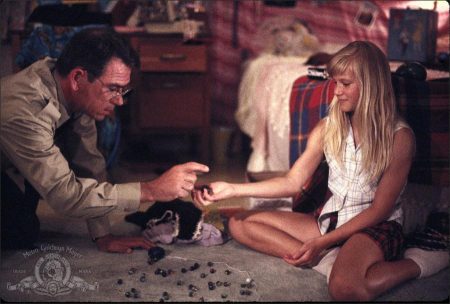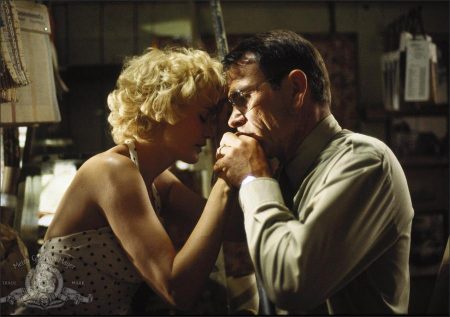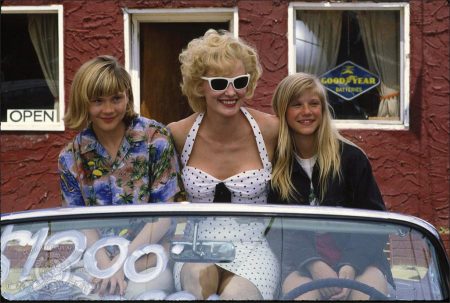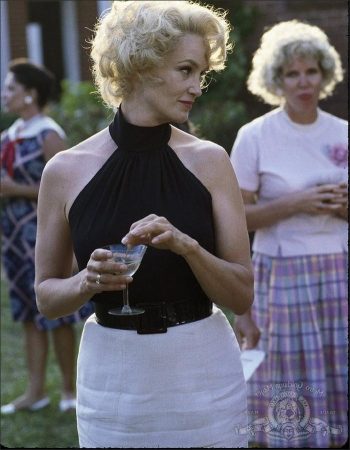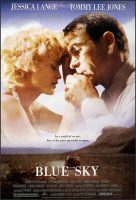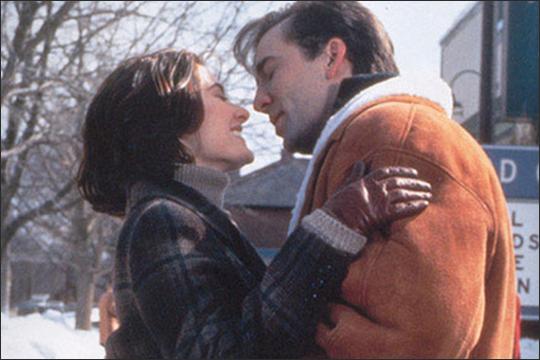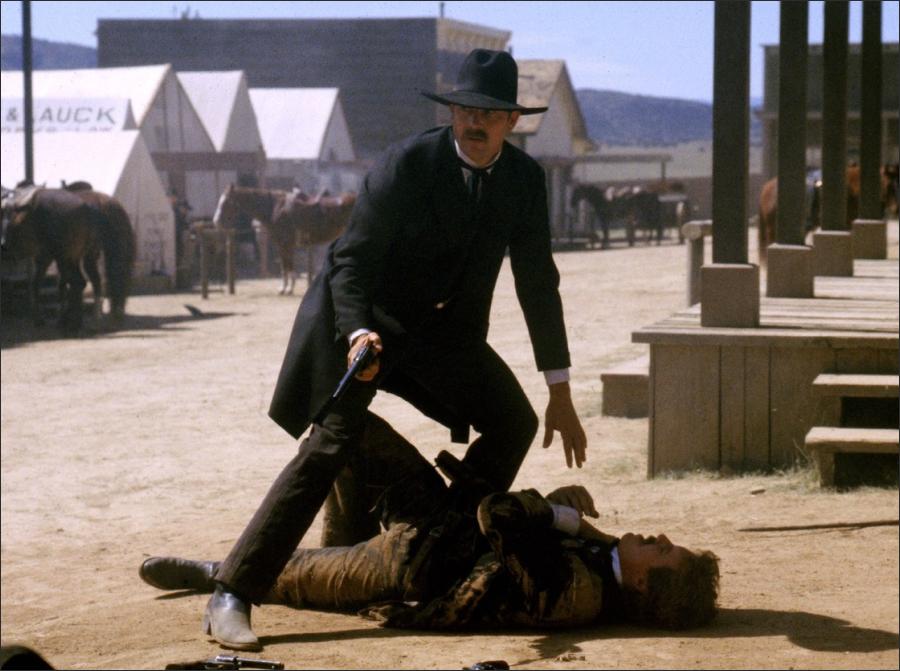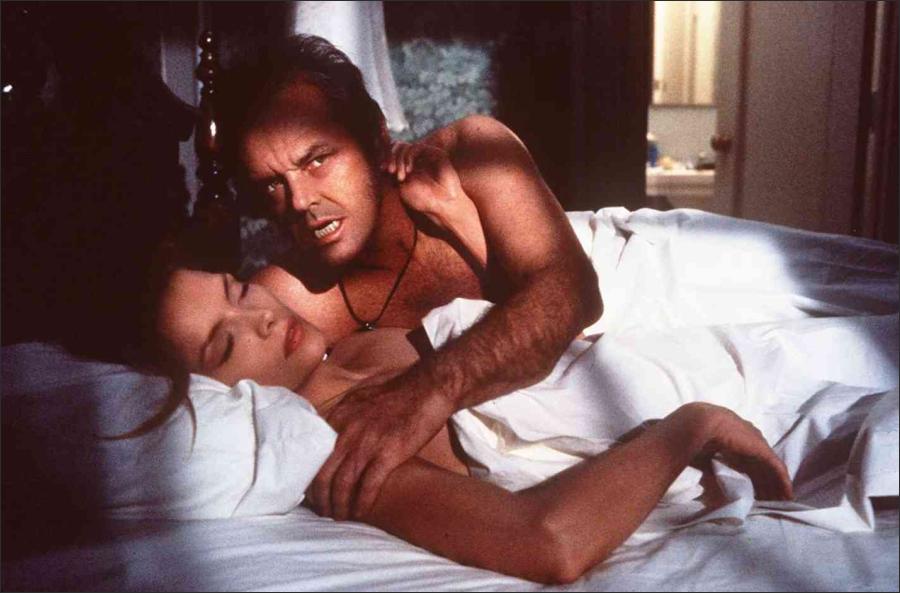Taglines: In a world of secrets, love is the most powerful weapon.
Blue Sky movie storyline. It’s the early 1960s. Nuclear engineer Hank Marshall is a major in the US Army, he who works on top secret nuclear testing projects. Trouble follows him from posting to posting largely because of his mentally unstable wife, Carly Marshall, who is bipolar. During her manic phases, her already overt sexuality, which she models after such sex symbols as Marilyn Monroe and Brigitte Bardot, is ratcheted up a notch, that partying behavior which is mixed with less frequent phases of physically destructive behavior.
Regardless, Hank and Carly love each other, Hank who would admit to himself that he enjoys the fact that other men find Carly attractive, which is partly why he allows her to act the way she does in public. They, in turn, mutually love their now two teenaged daughters, Alex and Becky. Reassigned from their two year posting in Hawaii largely due to the ruckus Carly has caused there, they are next sent to Alabama, the base under the command of Vince Johnson, his wife, Vera Johnson, who heads the wives’ welcoming committee.
Alex, at an age of starting to test her own sexuality, starts to date the Johnsons’ son, Glenn. Due to no fault of his own, Hank faces some problems in the latest project on which he is working, code named Blue Sky. And Carly continues her regular behavior, which catches Vince’s overtly wandering eye. These items in combination lead to the potential of the Marshalls’ home life being pulled apart and Hank’s career destroyed, both irreparably.
Blue Sky is a 1994 American drama film and the last film by veteran filmmaker Tony Richardson. It was adapted by Rama Stagner, Arlene Sarner and Jerry Leichtling. It stars Tommy Lee Jones, Jessica Lange, Powers Boothe, Carrie Snodgress, Amy Locane, Galynn Duggan, and Chris O’Donnell. The original music score was composed by Jack Nitzsche.
Being filmed in 1990 with production dates from 14 May 1990 until 16 July 1990, the film was completed in 1991, but because of the bankruptcy of Orion Pictures, it sat on the shelf until 1994, three years after Richardson’s death on November 14, 1991. Despite this, it won critical praise and Lange won the 1994 Academy Award for Best Actress, along with the Golden Globe Award and the Los Angeles Film Critics Association award.
The film is based on Rama Stagner-Blum’s real life and the relationship between her parents, Clyde and Gloria Lee Moore-Stagner during the 1960s while her father was in the army. They later divorced and Gloria remarried before dying in 1982.
Awards and Nominations
Winner Best Actress – Academy Awards (Jessica Lange)
Winner Best Actress – Golden Globes (Jessica Lange)
Nominee Best Actress – Screen Actors Guild (Jessica Lange)
Nominee Best Actress – Chicago Film Critics Association (Jessica Lange)
Winner Best Actress – Los Angeles Film Critics Association (Jessica Lange)
Nominee Best Actress – National Society of Film Critics (Jessica Lange)
Winner Best Foreign Actress – Sant Jordi Awards (Jessica Lange)
Film Review for Blue Sky
“Tom Jones” will always be the first film that comes to mind at the mention of Tony Richardson’s name. The director’s career was uneven after that 1963 high point. But “Blue Sky,” the film he completed shortly before he died of AIDS three years ago, turns out to be a wonderful posthumous triumph. Put on the shelf after Orion Pictures’ bankruptcy, “Blue Sky” is among Richardson’s finest work, a film as strong and as flawed as its heroine.
Set in 1962, it is a powerful portrait of a family imploding. Jessica Lange is the manic-depressive Carly Marshall, an Army officer’s wife who can hardly tell her own life from Brigitte Bardot’s. Tommy Lee Jones is her husband, Hank, an engineer who studies the lethal effects of nuclear testing.
Although the film’s subplot concerns Hank’s uneasiness about nuclear tests, the focus of the story is on Carly. It is a lavish role for Ms. Lange, and she brings to it fierce emotions and tact. At the start, Carly is seen bathing topless on a beach in Hawaii, then doing a flamenco for a group of visiting soldiers. She models her behavior as well as her clothes (a series of tight strapless dresses) on that of movie stars like Marilyn Monroe.
It doesn’t take much for her to scandalize the Army community, and soon the family, including Carly and Hank’s two adolescent daughters, have been transferred to Alabama. With her fantasies about the Hollywood career she might have had and her uncontrollable actions, Carly echoes Ms. Lange’s dazzling role in “Frances.”
When Carly sees the shabby, claustrophobic house that awaits them, she falls apart. She screams, smashes furniture, then tears away in the family’s Chevrolet station wagon. While Hank goes after her, the younger daughter, Becky (Anna Klemp), says, “It’s starting again.” The older daughter, Alex (Amy Locane), is at a more irreverent age. “He’s blind and she’s crazy,” she says of her parents. And when Alex tells her father that her mother needs help, he calls her Miss Freud and insists he can handle things. “Blue Sky” is a magnificent period piece, from the details of the Marshalls’ lives to Hank’s attitude that family problems should stay in the family.
Mr. Jones’s performance matches Ms. Lange’s in strength and subtlety. Hank is a tough, controlled military man whose competence masks the strain of caring for his wife. At a dance on the Army base, Hank refuses to dance with Carly, so she takes to the floor with his manipulative commanding officer, Vince Johnson (Powers Boothe). They all but seduce each other on the dance floor. Hank’s response is to drag Carly away and desperately toss her into a swimming pool. He is a patient, frustrated man coming to the end of his rope.
When the Marshalls’ lives are finally unraveling, Hank quietly tells Carly: “I don’t know how much longer I can go on. I’m tired.” The understated depths Mr. Jones reaches offer a reminder of his range after a series of over-the-top character roles in films like “The Client” and “Natural Born Killers.”
The problems in “Blue Sky” turn up in a script that is sometimes obvious and melodramatic. When the commanding officer’s wife (Carrie Snodgress) introduces herself to Carly, one of the first things she says is, “The officers’ wives, we’re doing a show,” a line that can only make the audience think, “Uh-oh.” And the Johnsons conveniently have a son (Chris O’Donnell) who falls for Alex. That romance seems invented so that the teen-agers can glimpse his father and her mother in the middle of a tryst. Yet the acting overcomes the screenplay’s flaws.
For a long while the plot about a secret test project called “Blue Sky” doesn’t seem to mesh with the family story, but at the end this subplot comes to the front. Hank is put in a mental hospital and drugged to keep him quiet. Carly has to find a way to save him, which she does with typical dramatic flair.
Three years on the shelf haven’t hurt “Blue Sky,” a film that arrives in time to burnish Tony Richardson’s reputation. At his best, he evoked unsurpassed emotions from actors and put them indelibly on screen.
Blue Sky (1994)
Directed by: Tony Richardson
Starring: Jessica Lange, Tommy Lee Jones, Powers Boothe, Carrie Snodgress, Amy Locane, Chris O’Donnell, Mitchell Ryan, Dale Dye, Annie Ross, Anna Klemp
Screenplay by: Rama Laurie Stagner, Arlene Sarner, Jerry Leichtling
Production Design by: Timian Alsaker
Cinematography by: Steve Yaconelli
Film Editing by: Robert K. Lambert
Costume Design by: Jane Robinson
Set Decoration by: Leslie E. Rollins
Art Direction by: Gary Constable
Music by: Jack Nitzsche
Distributed by: Orion Pictures, Metro-Goldwyn-Mayer
Release Date: September 16, 1994
Views: 449
